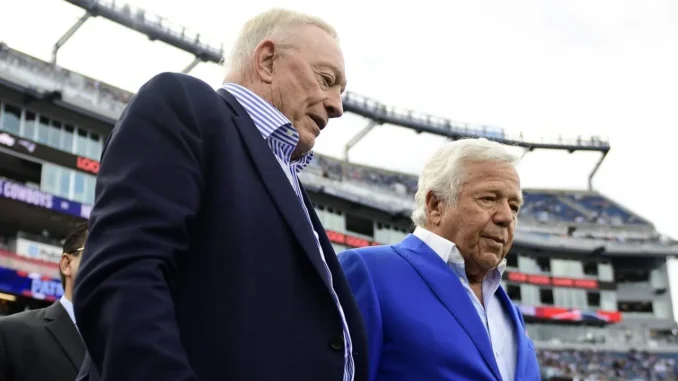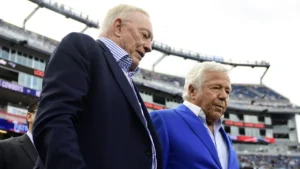
GOODELL, KRAFT, JONES TOP NFL SUNDAY TICKET WITNESS LIST
NFL commissioner Roger Goodell, owner of the New England Patriots Robert Kraft, and owner of the Dallas Cowboys Jerry Jones are among the possible witnesses in a case that has the potential to change sports broadcasting.
The NFL and a number of well-known witnesses associated with the league could appear in a Los Angeles courtroom starting on February 22 to defend the Sunday Ticket’s legality against a class-action lawsuit, barring a settlement or postponement.
On Friday, the league and plaintiffs—two certified classes that represent at least 2.4 million residential subscribers who purchased the Sunday Ticket after June 17, 2011, and at least 48,000 commercial establishments that have subscribed during the same period—jointly filed their witness lists. Some of the witnesses would be expected to testify live while others would give testimony through sworn, out-of-court depositions.
The main question in the case is whether the NFL and its clubs’ agreement to allow Sunday Ticket to offer out-of-market broadcasts violates antitrust laws since it prevents individual teams from being able to sell their broadcasting rights to other markets. The Cowboys, for instance, could potentially work out a TV deal with a Chicago station to air Cowboys games, given their large fan base in the city. At the moment, Chicago-based Cowboys fans must subscribe to Sunday Ticket in order to watch their team, as all of the teams agree not to market games in out-of-town markets.
The plaintiffs say they will call Jones, a member of the league’s broadcast and media committees, to testify about “the rights of NFL teams to license game broadcasts and trademarks and the distribution of out-of-market games on television.” Another member of those committees, Kraft, will similarly be expected to discuss the “the exclusive distribution arrangement of Sunday Ticket in the United States and the packages offered through Sunday Ticket.”
The NFL intends to question Goodell about, among other topics, the distribution of NFL games and the league’s contractual arrangements with broadcasting partners. He would also discuss the relationship between the league itself and teams, and how that shapes their broadcasting arrangements. Other listed league witnesses include CBS Sports chair Sean McManus and Fox Sports executive VP Lawrence Jones, with Kraft and Jerry Jones listed as possible defense witnesses.
While the witness list is chock-full of big names in NFL and sports media circles, the latest court filing indicates the lion’s share of the testimonial time will be consumed by expert witnesses, namely two economists—Daniel Rascher, testifying on behalf of the plaintiffs, and Douglas Bernheim, on behalf of the NFL defendants. Rascher, a professor at the University of San Francisco, previously served as the main expert for the college athlete plaintiffs who successfully sued the NCAA over its cap on educational related benefits in NCAA v. Alston. Bernheim, a professor at Stanford, was the expert retained by Fortnite-maker Epic Games, which won a unanimous jury verdict last month in its antitrust suit against Google over its app distribution service, Google Play.
Based on the witness list, the trial could complicate the lives of other media and sports companies that are tangentially related to the dispute at hand. For example, the plaintiffs say they expect to call Steve Bornstein, now the North American president for Genius Sports—who previously served as an ESPN executive and as CEO of the NFL Network. Bornstein, the plaintiffs say, “will testify about the popularity of NFL game telecasts, the creation and distribution of NFL RedZone, and league policies regarding game broadcasts.”
Genius Sports became the NFL’s official data provider in 2021, agreeing to pay the league hundreds of millions in cash and equity in a partnership that has since been extended. The NFL and the English Premier League are Genius’ most important sports partners by a wide margin, given the exclusive nature of their relationships and the global popularity of their contests.
Bornstein was hired to run Genius’ U.S. business shortly after that deal was announced, with the NFL relationship being his chief mandate and his NFL experience no doubt viewed as an asset. That same year Genius appointed Kim Williams-Bradley, another former NFL and NFL Network executive, to its board.
Based on court documents, damages of approximately $6.1 billion are projected if the class action plaintiffs win. A trial loss might be appealed by the NFL to the US Supreme Court as well as the US Court of Appeals for the Ninth Circuit. The Ninth Circuit has already evaluated this lawsuit, which started in 2015, on relevant grounds. It might end up back there.
It’s also possible that before the trial starts, the plaintiffs and the league will work out a settlement. In a settlement, class members would give up their claims in exchange for money from the league.
The NFL would most likely be interested in a settlement. The league probably wants to keep the owners from having to answer questions on a variety of subjects that could lead to uncomfortable admissions during cross-examination by knowledgeable litigators. Recall that although owners are used to being in command because, well, they are owners, the power dynamics in a trial would be completely different.
They would be on the witness stand in a federal courtroom, looking up at a judge sat above and the jury members closely observing them while they were required to provide sworn testimony (under penalty of perjury) in response to questions from an experienced attorney. There won’t be an owner in command.
Recall that in 2021, only six weeks prior to a trial in which owners and league officials were scheduled to testify over the contentious process that resulted in the Rams’ relocation to Los Angeles, the NFL and the city and county governments of St. Louis struck a $790 million settlement.

Leave a Reply